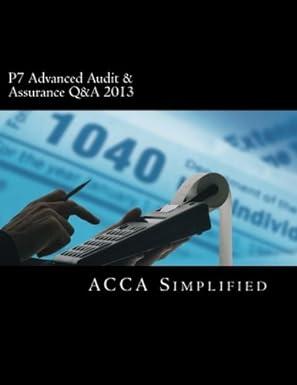Question
1) Which one of the following is a central assumption of Positive Accounting Theory? a. Financial statements will be audited regardless of legal requirements. b.
1)
Which one of the following is a central assumption of Positive Accounting Theory?
a.
Financial statements will be audited regardless of legal requirements.
b.
The interests of principals and agents are not aligned.
c.
Firms seek to maximize profits.
d.
Individuals act solely on the basis of self-interest.
2)
Which type of hypothesis in positive accounting theory is built on agency relationship where one party (a principal) delegates some decision making authority to another party (the agent)?
a.
The accounting theory
b.
The normative theory
c.
None of these.
d.
The bonus plan theory
3)
How does accounting help the capital allocation process attract capital investment?
a.
Provides timely, relevant information.
b.
Encourages entrepreneurship.
c.
Helps in planning and decision making.
d.
Promotes productivity.
4)
The International Accounting Standard Boards mission is to develop the IFRS and to bring some advantages to the financial markets. Identify the advantages of the mission:
a.
To attain efficiency worldwide.
b.
To make the people accountable for their actions
c.
All of these.
d.
To provide transparency in the conduct of its affairs.
5)
In Enron and WorldCom cases, the US GAAP failed to become effective. This led to the rules vs. principles debate back on center stage. Which among the following is correct regarding the assumptions of principle based accounting standards.
a.
However, it is said that they are easier to manipulate because there are no hard rules. They also leave too much to interpretation.
b.
All of these statements are correct.
c.
They are believed to yield a less complex financial reporting paradigm that is more responsive to emerging issues.
d.
Principle-based accounting standards are broad and require more judgment by both companies and auditors.
6)
The ability to document the research work done by the researcher requires :
a.
Communication
b.
All of these.
c.
Ability to defend the research
d.
Documentation
7)
Which one of the following is a fundamental quality of useful accounting information?
a.
Relevance
b.
Neutrality
c.
Materiality
d.
Understanability
8)
There are several areas of self-interest that drives companies to embrace more effective governance and without which they tend to be weak and sluggish. Which one of the following does not lead to effective governance?
a.
It will assist in establishing and strengthening the independence and objectivity of the directors and the internal and external auditors.
b.
It also helps to assure effectiveness and integrity of a companys business processes.
c.
It helps to instill trust in customers and vendors.
d.
Effective governance helps to minimize reputational risks.
9)
In determining independence with respect to any audit engagement, the ultimate decision as to whether or not the auditor is independent must be made by the:
a.
Auditor.
b.
Public.
c.
Client.
d.
Audit committee.
10)
Capital maintenance means that:
a.
The money capital at the end of the accounting period is the same as at the beginning
b.
The owner has not taken home any of the business assets
c.
The non-current assets of the business are maintained in an excellent state of repair
d.
All assets of the business are maintained in an excellent state of repair
Step by Step Solution
There are 3 Steps involved in it
Step: 1

Get Instant Access to Expert-Tailored Solutions
See step-by-step solutions with expert insights and AI powered tools for academic success
Step: 2

Step: 3

Ace Your Homework with AI
Get the answers you need in no time with our AI-driven, step-by-step assistance
Get Started


